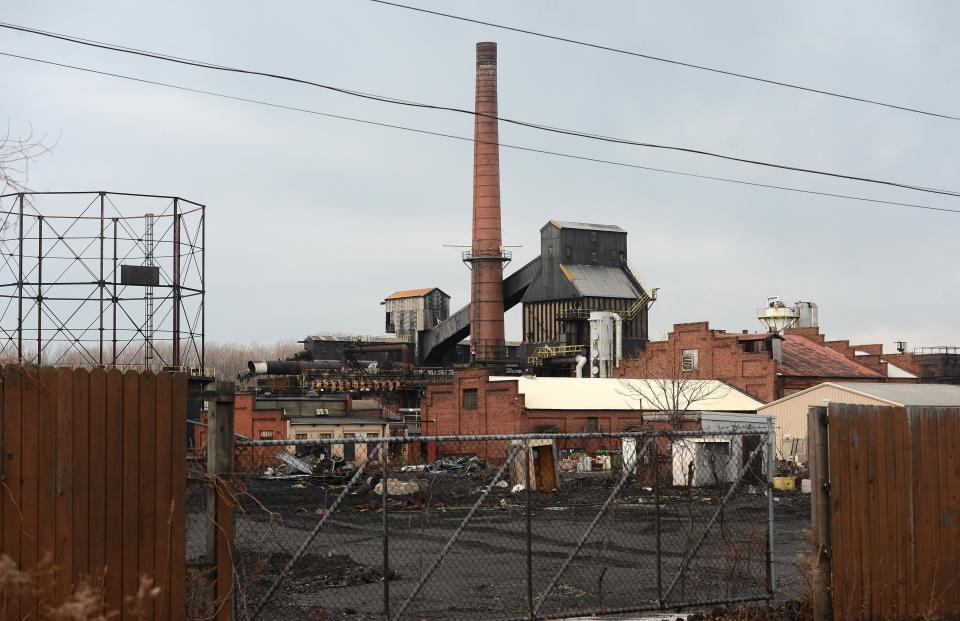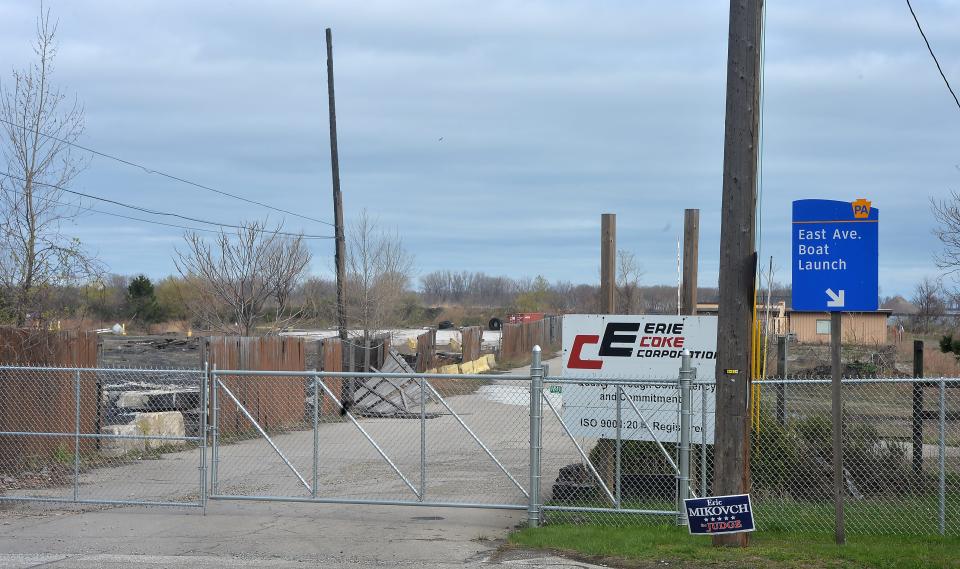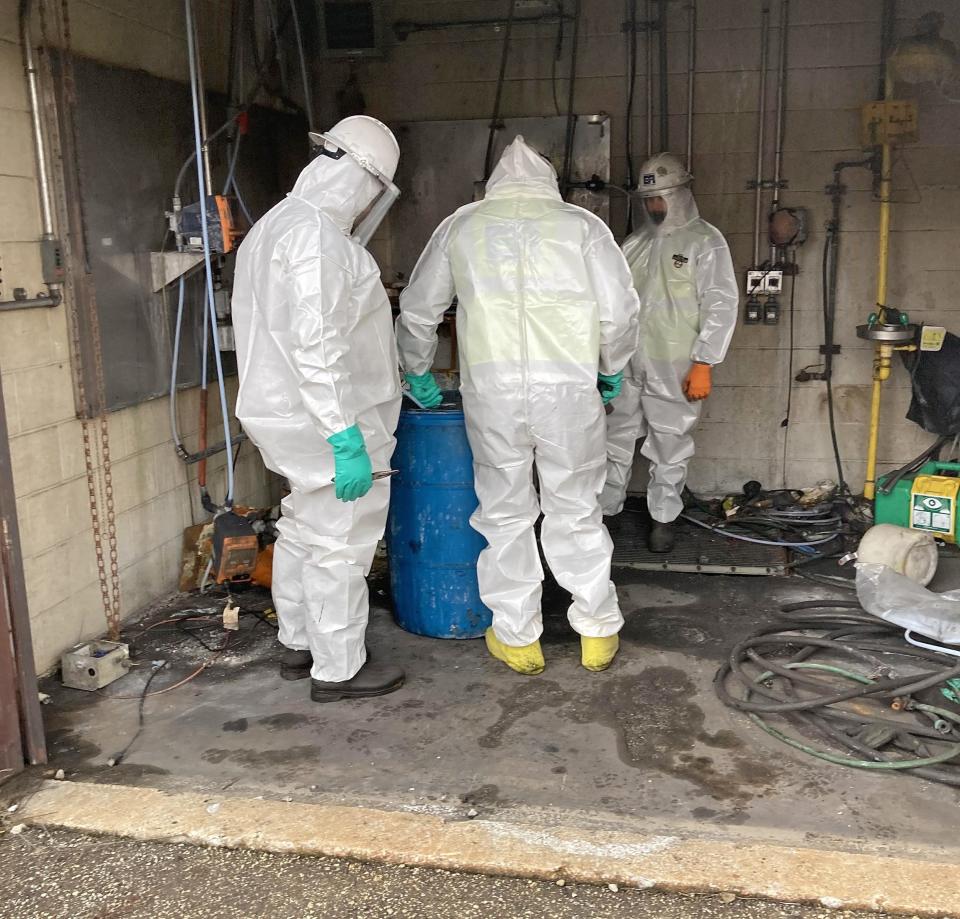Erie Coke finally gets lawyers, moving along Clean Air Act case in federal court
After Erie Coke was indicted in November on charges that it violated federal air pollution rules for years, the corporation was without legal representation as the criminal case against advanced in U.S. District Court in Erie.
That situation has changed. Erie Coke is now in a position to prepare a defense.
Erie Coke has hired lawyers.
They want until Sept. 4 to file pretrial motions along with the company's co-defendant, Anthony Nearhoof, the last superintendent of the plant that made coke — a derivative of coal produced by heating coal in high-temperature ovens — at the foot of East Avenue in Erie. The plant closed due to environmental problems in December 2019.
Lawyers for Erie Coke and Nearhoof asked for the Sept. 4 deadline in a joint motion they filed on Thursday before U.S. District Judge Susan Paradise Baxter.

The deadline for filing pretrial motions had been July 5 for Nearhoof. Erie Coke never had a deadline because it was without lawyers at the start of the case, according to the motion. A federal grand jury in Erie returned the indictment on Nov. 15.
The lawyers for Erie Coke and Nearhoof said they want the same deadline for filing pretrial motions so they are on the same schedule in the case, according to Thursday's motion. The lawyers said they need until Sept. 4 to file the pretrial motions partly because of the large amount of evidence the U.S. Attorney's Office has provided them in the pretrial discovery process.
"Defendants and their counsel have begun to review all of the discovery provided by the government, but because of its volume, and in light of the nature and scope of the allegations, they have not yet been able to fully evaluate pretrial motions," according to the motion.
Erie Coke's corporate links detailed in new filing
No matter when the lawyers for Erie Coke file their pretrial motions, the lawyers' appearance on the docket clears up two issues that had clouded the case: whether Erie Coke still exists as a corporate entity, and whether that entity would hire lawyers.

Erie Coke Corp. still exists as wholly owned subsidiary of an entity called Garner LLC, Erie Coke's lawyers said in a motion filed May 25, five days after the lawyers were admitted to represent Erie Coke in U.S. District Court in Erie.
Garner LLC, a holding company, is owned by another holding company, Cooper Meridian LLC, according to other court records, filed in 2019. Cooper Meridian, according to the records, is owned by trusts controlled by the family of J.D. Crane, the Buffalo-area businessman who owned Erie Coke until he died at 92 in 2014.
Crane bought Erie Coke from the Pittsburgh-based Koppers Inc. in 1987. After Crane died, his grandson headed Erie Coke. Crane's company also owned Tonawanda Coke, Erie Coke's sister plant, near Buffalo. That plant closed in 2018 due to environmental violations. Tonawanda Coke also filed for bankruptcy, unlike Erie Coke. Tonawanda Coke was demolished in 2021.
The lawyers for Erie Coke in the criminal case are from Buffalo. The lead lawyer, Rodney Personius, declined to comment.
Erie Coke was arraigned in absentia on Dec. 7 at the federal courthouse in Erie. No person appeared to represent the corporation in court, leaving the federal magistrate judge who handled the arraignment, Richard A. Lanzillo, to enter the plea of not guilty on Erie Coke's behalf.
Sentencing rescheduled for 2nd ex-Erie Coke employee charged
Erie Coke faces the possibility of large fines if convicted, though none of its top corporate officials were indicted. Nearhoof, the plant superintendent, was one of two individuals charged in the case. The other person is a supervisor at the plant, David Stablein, who worked under Nearhoof.

The Pittsburgh-based U.S. Attorney's Office for the Western District of Pennsylvania charged Stablein in a separate case in December. He pleaded guilty in February to a felony conspiracy count of violating the federal Clean Air Act. He was charged with working with the Nearhoof to deliberately bypass environmental monitoring systems to prevent the detection of air-quality violations at Erie Coke from October 2015 to September 2018.
Stablein faces up to five years in federal prison. Baxter had scheduled his sentencing for Friday at the federal courthouse in Erie, but she rescheduled the hearing for Aug. 2. Stablein, 54, of Fairview Township, is free on an unsecured bond of $10,000.
Nearhoof, 41, of Pittsburgh, pleaded not guilty at his arraignment on Nov. 17, two days after he was indicted with Erie Coke as a corporation. He has had a lawyer since the start of the case, and he is also free on an unsecured bond of $10,000.
Erie Coke saga pitted environmental agencies vs. company
The eight-count indictment against Nearhoof and Erie Coke Corp. charges them with conspiring to violate the Clean Air Act for four years, ending in December 2019, by deliberately bypassing the pollution monitors. They are also accused of tampering with measurements on heating systems that emitted contaminants and pollutants into the air, including the chemicals benzene, toluene and xylene, according to the U.S. Attorney's Office. The EPA classifies benzene as a known carcinogen.
The indictment alleges Nearhoof and Erie Coke bypassed the pollution monitors to reduce "the likelihood of enforcement actions by state and federal regulators," avoid the cost of repairs and maximize "revenues and profits by running the plant as much as possible."
The 137-employee Erie Coke plant made coke by heating coal in batteries of ovens to burn off impurities and create a fuel source that is used in a variety of industries, including steel mills, according to the indictment. Industries had operated since 1833 on the 183-acre East Avenue site — on Lake Erie just east of Presque Isle Bay— and coke production began there in 1925.
The closing of the Erie Coke plant, in December 2019, ended a protracted legal battle between the company and the state Department of Environmental Protection. The DEP announced in July 2019 that it would not renew the plant’s Title V operating permit because of persistent violations of environmental rules.
The site is getting cleaned up in a government-funded project that the federal Environmental Protection agency has estimated will cost more than $7 million. To help recover the costs, the EPA in August 2021 placed a $1 million lien on three parcels on the site. Erie Coke still owns the property. The lien will get paid when the property is sold.
Contact Ed Palattella at epalattella@timesnews.com. Follow him on Twitter @ETNpalattella.
This article originally appeared on Erie Times-News: Erie Coke Corp. finally hires lawyers in Clean Air Act case

 money
money 